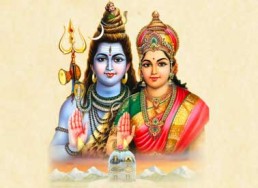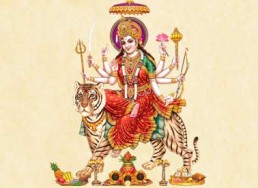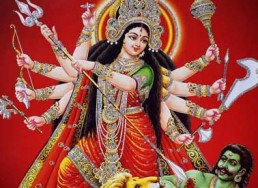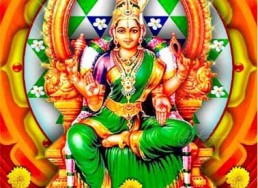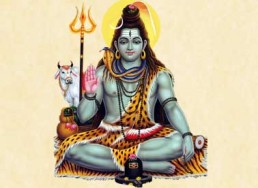Ayigiri Nandini
Pages related to Aigiri Nandini Stotram
Sanskrit, English and Meaning
Verse by Verse with Word meanings
Chanting – English only
Chanting – Sanskrit only
Note: In any of our pages, look for ‘Select/Change script’ on the top right. Here you can select the language to be displayed.
Mahishasura Mardini Stotram
The Mahishasura Mardini Stotram also known popularly as Aigiri Nandini, holds immense significance during Navratri. The word Mahisha means buffalo and Asura means Rakshasa or Demon. Composed by the great sage Adi Shankaracharya around 810 AD, this stotram is based on the Devi Mahatmyam and extols the different powers (shaktis) of the Devi. The Devi takes different forms of Durga, Lakshmi and Saraswati and destroys the demons – Madhu and Kaitabha, Mahishasura, and Sumbha and Nisumbha. For more information please scroll down.
Mahishasura Mardini Stotram
गिरिवरविंध्यशिरोधिनिवासिनि विष्णुविलासिनि जिष्णुनुते ।
भगवति हे शितिकण्ठकुटुंबिनि भूरिकुटुंबिनि भूरिकृते
जय जय हे महिषासुरमर्दिनि रम्यकपर्दिनि शैलसुते ॥ १॥
girivaraviṃdhyaśirodhinivāsini viṣṇuvilāsini jiṣṇunute .
Bhagavati he śitikaṇṭhakuṭuṃbini bhūrikuṭuṃbini bhūrikṛte
jaya jaya he mahiṣāsuramardini ramyakapardini śailasute .. 1..
O daughter of the mountain, who makes the whole earth happy, who makes the whole universe rejoice, praised by Nandin. Dwelling on the peak of the great Vindhya mountain, glittering widely, (variation? giver of joy to Vishnu), praised by those desirous of victory. O Goddess, wife of the blue necked Siva, One who has many families, One who has done a lot, be victorious, be victorious, O destroyer of the demon mahisa, with beautiful braids of hair, daughter of the mountain Himalaya.
त्रिभुवनपोषिणि शंकरतोषिणि किल्बिषमोषिणि घोषरते ।
दनुजनिरोषिणि दितिसुतरोषिणि दुर्मदशोषिणि सिन्धुसुते
जय जय हे महिषासुरमर्दिनि रम्यकपर्दिनि शैलसुते ॥ २॥
tribhuvanapoṣiṇi śaṃkaratoṣiṇi kilbiṣamoṣiṇi ghoṣarate .
Danujaniroṣiṇi ditisutaroṣiṇi durmadaśoṣiṇi sindhusute
jaya jaya he mahiṣāsuramardini ramyakapardini śailasute .. 2..
O bestower of boons on Gods, One who assails those hard to control, who tolerates those with ugly faces (?), one engrossed in rejoicing . One who nourishes the three worlds, One who pleases sankara, One who removes sins, One who engrosses in sound of Om (?) . One who is angry with the progeny of Danu (demon), One who is angry with the sons of Diti (also demon), One who destroys those with evil intoxication of pride, daughter of the ocean.
शिखरिशिरोमणि तुङ्गहिमालय शृंगनिजालय मध्यगते ।
मधुमधुरे मधुकैटभगंजिनि कैटभभंजिनि रासरते
जय जय हे महिषासुरमर्दिनि रम्यकपर्दिनि शैलसुते ॥ ३॥
śikhariśiromaṇituṅgahimālayaśṛṃganijālayamadhyagate .
Madhumadhure madhukaiṭabhagaṃjini kaiṭabhabhaṃjini rāsarate
jaya jaya he mahiṣāsuramardini ramyakapardini śailasute .. 3..
O mother of the world, my mother, One who loves to dwell in a forest of Kadamba trees, One who keeps on smiling . One who is on her own dwelling on the tall peak of the Himalaya, the greatest among the mountains . One who is very sweet like honey, One who has the treasure of demons Madhu and Kaitabha, destroyer of the demon Kaitabha, engaged in dancing.
रिपुगजगण्ड विदारणचण्ड पराक्रमशुण्ड मृगाधिपते ।
निजभुजदण्ड निपातितखण्ड विपातितमुण्ड भटाधिपते
जय जय हे महिषासुरमर्दिनि रम्यकपर्दिनि शैलसुते ॥ ४ ॥
Ripugajagaṇḍa vidāraṇacaṇḍa parākramaśuṇḍa mṛgādhipate .
Nijabhujadaṇḍa nipātitakhaṇḍa vipātitamuṇḍa bhaṭādhipate
Jaya jaya he mahiṣāsuramardini ramyakapardini śailasute .. 4 ..
O One who split the heads (of demons) into hundreds of pieces and One who cut the trunks of great battle elephants . whose great lion is skilled in terrifying valor in tearing apart the temples of enemy elephants . One who has cut down into pieces the heads of enemy chieftains with the strength of her own arms.
चतुरविचार धुरीणमहाशिव दूतकृत प्रमथाधिपते ।
दुरितदुरीह दुराशयदुर्मति दानवदुत कृतान्तमते
जय जय हे महिषासुरमर्दिनि रम्यकपर्दिनि शैलसुते ॥ ५ ॥
Caturavicāra dhurīṇamahāśiva dūtakṛta pramathādhipate .
Duritadurīha durāśayadurmati dānavaduta kṛtāntamate
Jaya jaya he mahiṣāsuramardini ramyakapardini śailasute .. 5 ..
O One who holds the invincible and undiminishing striking force which arose on the occasion of killing the enemies who were hard to subdue on the battlefield . who made Pramatha, the great attendant of Shiva, a leader in subtle thinking, her commander (?) . who decided to destroy the messenger of demons who were sinful, with evil intentions, thoughts and mind.
त्रिभुवनमस्तक शुलविरोधि शिरोऽधिकृतामल शुलकरे ।
दुमिदुमितामर धुन्दुभिनादमहोमुखरीकृत दिङ्मकरे
जय जय हे महिषासुरमर्दिनि रम्यकपर्दिनि शैलसुते ॥ ६ ॥
Tribhuvanamastaka śulavirodhi śiro’dhikṛtāmala śulakare .
Dumidumitāmara dhundubhinādamahomukharīkṛta diṅmakare
Jaya jaya he mahiṣāsuramardini ramyakapardini śailasute .. 6 ..
O One who gives protection to the great heroic husbands of the enemy wives who have come seeking refuge . One who holds in her hands a spotless spear pointed towards the head of the opponent who is causing a great pain for all the three worlds . One who is like the blazing hot sun, aroused by the power of resounding noise of the drums of Gods.
समरविशोषित शोणितबीज समुद्भवशोणित बीजलते ।
शिवशिवशुम्भ निशुम्भमहाहव तर्पितभूत पिशाचरते
जय जय हे महिषासुरमर्दिनि रम्यकपर्दिनि शैलसुते ॥ ७ ॥
Samaraviśoṣita śoṇitabīja samudbhava śoṇitabījalate .
Śivaśiva śuṃbha niśuṃbha mahāhava tarpitabhūtapiśācarate
Jaya jaya he mahiṣāsuramardini ramyakapardini śailasute .. 7..
O One who has blown aside hundreds of streams of smoke coming from demons with smoking eyes merely with her own roaring . who is like a vine of blood-drops grown from the dried blood drops in battle . One who delights in the company of auspicious Shiva, Shumbha, Nishumbha, and the spirits who were fed during the great battle.
कनकपिशङ्ग पृषत्कनिषङ्ग रसद्भटशृङ्ग हताबटुके ।
कृतचतुरङ्ग बलक्षितिरङ्ग घटद्बहुरङ्ग रटद्बटुके
जय जय हे महिषासुरमर्दिनि रम्यकपर्दिनि शैलसुते ॥ ८ ॥
Kanakapiśaṅga pṛṣatkaniṣaṅga rasadbhaṭaśṛṅga hatābaṭuke .
Kṛtacaturaṅga balakṣitiraṅga ghaṭadbahuraṅga raṭadbaṭuke
Jaya jaya he mahiṣāsuramardini ramyakapardini śailasute .. 8 ..
One who decks herself with dancing ornaments on throbbing limbs at the moment of the battle, making her bow ready . who killed the huge enemy soldiers with a shining sword and with (arrows from) a quiver which has golden brown spots . who made the battleground with fourfold army into a stage with a colorful drama with screaming little soldiers.
कृत कुकुथः कुकुथो गडदादिकताल कुतूहल गानरते ।
धुधुकुट धुक्कुट धिंधिमित ध्वनि धीर मृदंग निनादरते
जय जय हे महिषासुरमर्दिनि रम्यकपर्दिनि शैलसुते ॥ ९ ॥
Kṛta kukuthaḥ kukutho gaḍadādikatāla kutūhala gānarate .
Dhudhukuṭa dhukkuṭa dhiṃdhimita dhvani dhīra mṛdaṃga ninādarate
Jaya jaya he mahiṣāsuramardini ramyakapardini śailasute .. 9 ..
O you who take delight in the dancing of heavenly damsels made excellent by the acting out of tatatheyi-tatheyi-tatha/tathA! O you who are full of laughter, amorous gestures and hulAsa (meaning uncertain, but probably something along the lines of abandon)! O you who possess immeasurable love for afflicted persons bowing before you (i.e., seeking refuge in you)! O you who rejoice in the sustained/deep sound, dhimikaTa-dhikkaTa-dhikaTadhimi, of the mRdaGga drum! O vanquisher of the demon MahiSa! O one bearing attractive knotted hair! O daughter of the mountain! Victory to you!
झणझणझिञ्झिमि झिङ्कृत नूपुरशिञ्जितमोहित भूतपते ।
नटित नटार्ध नटी नट नायक नाटितनाट्य सुगानरते
जय जय हे महिषासुरमर्दिनि रम्यकपर्दिनि शैलसुते ॥ १० ॥
Jhaṇajhaṇajhiñjhimi jhiṅkṛta nūpuraśiñjitamohita bhūtapate .
Naṭita naṭārdha naṭī naṭa nāyaka nāṭitanāṭya sugānarate
Jaya jaya he mahiṣāsuramardini ramyakapardini śailasute .. 10 ..
Be victorious! be victorious! whose victory should be sung, praised by the whole universe ready to sing the praise extolling her victory . who attracted the attention of shiva by twinkling of bells making various sounds of dancing . who delights in beautiful singing and in dance-drama presented by a leading dancer acting out the role of an actress with half of his body.
श्रितरजनी रजनीरजनी रजनीरजनी करवक्त्रवृते ।
सुनयनविभ्रमर भ्रमरभ्रमर भ्रमरभ्रमराधिपते
जय जय हे महिषासुरमर्दिनि रम्यकपर्दिनि शैलसुते ॥ ११ ॥
Śritarajanī rajanīrajanī rajanīrajanī karavaktravṛte .
Sunayanavibhramara bhramarabhramara bhramarabhramarādhipate
Jaya jaya he mahiṣāsuramardini ramyakapardini śailasute .. 11 ..
O Divine Mother, I invoke You and take refuge in Your Auspicious Feet) Salutations to You O Divine Mother; I Invoke You; Whose Beautiful Mind is United with a Charming Appearance, (I Invoke You) Whose Beautiful Face makes Subserviant the Beauty of the Moon Light of Night by Hiding them with Its Own Beauty, Whose Beautiful Eyes Conquer the Beauty of the Bees by Its Own Beauty, Victory to You, Victory to You, (I take Refuge in Your Auspicious Feet) O the Destroyer of Demon Mahishasura; (Victory to You) Who Shine with Beautiful Locks of Hair and Who is the Daughter of the Mountain
विरचितवल्लिक पल्लिकमल्लिक झिल्लिकभिल्लिक वर्गवृते ।
शितकृतफुल्ल समुल्लसितारुण तल्लजपल्लव सल्ललिते
जय जय हे महिषासुरमर्दिनि रम्यकपर्दिनि शैलसुते ॥ १२ ॥
Viracitavallika pallikamallika jhillikabhillika vargavṛte .
Śitakṛtaphulla samullasitāruṇa tallajapallava sallalite
Jaya jaya he mahiṣāsuramardini ramyakapardini śailasute .. 12 ..
Salutations to the Divine Mother who is accompanied in the great battle against excellent wrestlers (fighters), by girls who appear tender like jasmine who are fighting against the enemies. whose accompaniments are composed of girls from the bheel tribe who are tender like creepers of village jasmine and buzz like swarms of bees (or crickets). On whose face plays a smile created By joy which appears like dawn shining forth with red colour and blossoming the excellent buds. Victory to you, the destroyer of the demon Mahishasura, who has beautiful locks of hair and who is the daughter of the mountain.
त्रिभुवनभूषण भूतकलानिधि रूपपयोनिधि राजसुते ।
अयि सुदतीजन लालसमानस मोहन मन्मथराजसुते
जय जय हे महिषासुरमर्दिनि रम्यकपर्दिनि शैलसुते ॥ १३ ॥
Tribhuvanabhūṣaṇa bhūtakalānidhi rūpapayonidhi rājasute .
Ayi sudatījana lālasamānasa mohana manmatharājasute
Jaya jaya he mahiṣāsuramardini ramyakapardini śailasute .. 13 ..
Who is in charge of huge royal elephants in fury whose rut is streaming down their temples incessantly . princess, the daughter of the ocean, who has the beauty of the moon, the ornament of all the three worlds . princess of cupid who enchants the minds desirous of ladies with beautiful teeth.
सकलविलास कलानिलयक्रम केलिचलत्कल हंसकुले ।
अलिकुलसङ्कुल कुवलयमण्डल मौलिमिलद्बकुलालिकुले
जय जय हे महिषासुरमर्दिनि रम्यकपर्दिनि शैलसुते ॥ १४ ॥
Sakalavilāsa kalānilayakrama kelicalatkala haṃsakule .
Alikulasaṅkula kuvalayamaṇḍala maulimiladbakulālikule
Jaya jaya he mahiṣāsuramardini ramyakapardini śailasute .. 14 ..
Whose spotless forehead is enhanced by the beautiful complexion, pure and delicate like that of lotus petals . whose flock of swans is moving sportingly with steps which are the marks of all beautiful arts . whose bees from the bakula trees meet on the tops of lotus flowers which are crowded with (their own) bees.
मिलितपुलिन्द मनोहरगुञ्जित रञ्जितशैल निकुञ्जगते ।
निजगणभूत महाशबरीगण सद्गुणसम्भृत केलितले
जय जय हे महिषासुरमर्दिनि रम्यकपर्दिनि शैलसुते ॥ १५ ॥
Militapulinda manoharaguñjita rañjitaśaila nikuñjagate .
Nijagaṇabhūta mahāśabarīgaṇa sadguṇasambhṛta kelitale
Jaya jaya he mahiṣāsuramardini ramyakapardini śailasute .. 15 ..
Whose sweet cooing sounds made with the flute held in her own hands have put to shame the Kokila bird and who has sweet thoughts . who is in colorful mountain groves pleasantly resounding with the assembled mountain folks . whose playbround is filled with good qualities of the flocks of the great tribal women who are manifestations of her own qualities.
प्रणतसुरासुर मौलिमणिस्फुर दंशुलसन्नख चन्द्ररुचे
जितकनकाचल मौलिमदोर्जित निर्भरकुञ्जर कुम्भकुचे
जय जय हे महिषासुरमर्दिनि रम्यकपर्दिनि शैलसुते ॥ १६ ॥
Praṇatasurāsura maulimaṇisphura daṃśulasannakha candraruce
Jitakanakācala maulimadorjita nirbharakuñjara kumbhakuce
Jaya jaya he mahiṣāsuramardini ramyakapardini śailasute .. 16 ..
Who has set aside the brilliance of the moon with the colorful rays coming from the yellow silk she is wearing on her waist . whose toe-nails shine like the moon because of the rays emanating form the crest jewels of the bowing gods and demons . whose breasts outshine the temples of wild elephants and the high peaks of the golden mountains.
कृतसुरतारक सङ्गरतारक सङ्गरतारक सूनुसुते ।
सुरथसमाधि समानसमाधि समाधिसमाधि सुजातरते ।
जय जय हे महिषासुरमर्दिनि रम्यकपर्दिनि शैलसुते ॥ १७ ॥
Kṛtasuratāraka saṅgaratāraka saṅgaratāraka sūnusute .
Surathasamādhi samānasamādhi samādhisamādhi sujātarate .
Jaya jaya he mahiṣāsuramardini ramyakapardini śailasute .. 17 ..
Oh Goddess, the only time praised by the thousand hands of Sahasrarjuna who had excelled the thousand-rayed Sun by his valour, having a son like Karttika who had fought a victorious battle in the clash between gods and Tarakasura, one for whom pleasure is created in the accomplishment (accorded by Şage Medhas) by giving justification for the self-same mental agony of (King) Suratha and (the vaisya) Samadhi, who has crushed the demon. Mahisha, wearing a charming knot of hair, Oh Daughter of Mountain (Himalaya), Victory to you, Victory to you.
अयि कमले कमलानिलये कमलानिलयः स कथं न भवेत् ।
तव पदमेव परम्पदमित्यनुशीलयतो मम किं न शिवे
जय जय हे महिषासुरमर्दिनि रम्यकपर्दिनि शैलसुते ॥ १८ ॥
Ayi kamale kamalānilaye kamalānilayaḥ sa kathaṃ na bhavet .
Tava padameva parampadamityanuśīlayato mama kiṃ na śive
Jaya jaya he mahiṣāsuramardini ramyakapardini śailasute .. 18 ..
O benevolent goddess accompanied by Shiva, if someone daily cherishes your lotuslike feet . (contd. from prev line) then, O lotus dwelling LakShmi, how will he not become wealthy? . O auspicious Goddess, is there anything that I would not have, if I earnestly believe that your feet are the highest goal to be achieved?
भजति स किं न शचीकुचकुम्भ तटीपरिरम्भसुखानुभवम् ।
तव चरणं शरणं करवाणि नतामरवाणि निवासि शिवम्
जय जय हे महिषासुरमर्दिनि रम्यकपर्दिनि शैलसुते ॥ १९ ॥
Bhajati sa kiṃ na śacīkucakumbha taṭīparirambh asukhānubhavam .
Tava caraṇaṃ śaraṇaṃ karavāṇi natāmaravāṇi nivāsi śivam
Jaya jaya he mahiṣāsuramardini ramyakapardini śailasute .. 19 ..
If someone bathes you, the playground of virtues, with shining golden waters of the ocean . will he not experience in heaven the happiness (equal to that of Indra) embracing the full bosom of Sachi? . O Goddess worshipped by the speech of Gods, I take refuge in your feet, which are also the abode of Shiva.
किमु पुरुहूतपुरीन्दु मुखी सुमुखीभिरसौ विमुखीक्रियते ।
मम तु मतं शिवनामधने भवती कृपया किमुत क्रियते
जय जय हे महिषासुरमर्दिनि रम्यकपर्दिनि शैलसुते ॥ २० ॥
Kimu puruhūtapurīndu mukhī sumukhībhirasau vimukhīkriyate .
Mama tu mataṃ śivanāmadhane bhavatī kṛpayā kimuta kriyate
Jaya jaya he mahiṣāsuramardini ramyakapardini śailasute .. 20 ..
Oh Pure One, the person who looks upon your moonlike face together with its digits causing a bond (with your essence) as the bank (beyond which the river of sorrow does not proceed) – will he ever be turned away by the ladies of Indra’s City, having moonlike faces and auspicious faces ? Oh Goddess, having the name of Siva as her treasure, or my opinion is that with kindness you achieve it. Oh Goddess, who has crushed the demon, Mahisha, wearing a beatiful know of hair, Oh Daughter of Mountain (Himalaya), Victory to you, Victory to you.
अयि जगतो जननी कृपयासि यथासि तथाऽनुमितासि रते ।
यदुचितमत्र भवत्युररीकुरुतादुरुतापमपाकुरुते
जय जय हे महिषासुरमर्दिनि रम्यकपर्दिनि शैलसुते ॥ २१॥
Ayi jagato jananī kṛpayāsi yathāsi tathānumitāsirate .
Yaducitamatra bhavatyurarīkurutādurutāpamapākurute
Jaya jaya he mahiṣāsuramardini ramyakapardini śailasute .. 21 ..
O Uma, you should be kindly disposed toward me because of your virtue of compassion toward the meek . (meaning unclear) . you may choose to do (with me) whatever is appropriate, she removes the great pain (of her devotees)
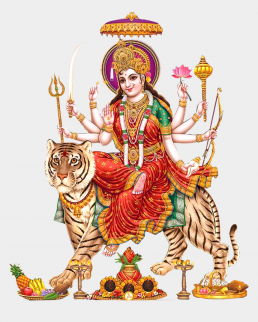
Description
Note: For a verse by verse chanting of Aigiri Nandini please click here .
Mahishasura Mardini Stotram
“The place where Sri Mahishasura Mardini Stotram is sung every day, I will always be present and never leave.”
– The Devi’s proclamation in the 12th chapter of the Devi Mahatmyam
The Mahishasura Mardini Stotram also known popularly as Aigiri Nandini, holds immense significance during Navratri. The word Mahisha means buffalo and Asura means Rakshasa or Demon. Composed by the great sage Adi Shankaracharya around 810 AD, this stotram is based on the Devi Mahatmyam and extols the different powers (shaktis) of the Devi. The Devi takes different forms of Durga, Lakshmi and Saraswati and destroys the demons – Madhu and Kaitabha, Mahishasura, and Sumbha and Nisumbha.
Mahishasura Mardini Stotram is said to bring peace to the devotee and removes all fear and sadness. It drives away negative emotions like doubt, anger, ego and inertia. This stotram also removes obstacles from the path of the believer. One can listen to Ayigiri Nandini (click the audio link above) however reciting the chants are considered to be more powerful.
The slaying of Mahishasura
When the Devi destroyed the army of Mahishasura – the King of Demons, Chakshura, the mighty general decided to fight the Devi himself. But very soon, after a fierce battle, the Devi slaughtered him into hundreds of pieces. As soon as the valiant general of Mahishasura was slain, Chamara, the afflicter of the gods came forward mounted on an elephant to try his luck in the great battle. The Devi’s lion pounced upon the elephant and the two battled fiercely till the end. The lion then struck Chamara with his paw and killed him.
Seeing his army being destroyed brutally by the Devi and her lion, Mahishasura took the form of a majestic and fierce Buffalo and terrified the troops of the Devi. Hitting some by muzzle, trampling some by his hooves, lashing at some with his tail, and tearing others with his horns. When he was done with the Devi’s army, Mahishasura rushed to slay the lion of the Devi. This enraged the Devi. Mahishasura, pounded the terrain with his hooves in rage, crushed the earth by his whirling speed and flooded the oceans.
When the Devi saw Mahishasura advancing towards her in such rage, she was angered and flung her noose over the great asura and bound him. But Mahishasura soon relinquished his buffalo form and became a lion. When the Devi cut the head of his Lion form, he took a human form. The Devi slayed the human form too immediately, and then the evil Mahishasura took the form of a huge Elephant. When the Devi cut off his trunk with her sword, the asura resumed his buffalo form and shook the three worlds. The enraged Goddess and Mahishasura continued to battle ferociously, till the Devi jumped in the air and landed herself on the buffalo form of Mahishasura. She crushed his neck under her feet and struck him with her spear. Caught helplessly under her foot, Mahishasura tried to take human form again but could only manage to reveal himself till his waist. Soon he was beheaded by the Devi. The battle thus ended and the entire army of Mahishasura perished.
The Gods along with the divine seers lauded the Goddess. The Gandharvas sang and the bevies of apsaras danced in celebration of Mahishasura’s end.
Mahishaasura, who kept transforming from a buffalo, to a lion, to a man, to an elephant, and then back to a buffalo, represents the never ending chain of desires in us. When one desire is fulfilled another springs and takes its place. There is a never ending transformation and multiplication of multifarious desires. This is called Vikshepa Shakti and its rooted in Rajo Guna or Rajas. This conquest of Mahishasura is symbolic to winning over the rajasic tendencies in us.
Significance of the Devi vanquishing the buffalo demon
Gurudev Sri Sri Ravi Shankar says: Navratri is a celebration of the spirit or prana which alone can destroy mahishasura (inertia), shumbha-nishumbha (pride and shame) and madhu-kaitabh (extreme forms of craving and aversion). They are completely opposites yet complementary. Inertia, deeply ingrained negativities and obsessions (raktabeejasura), unreasonable logics (chanda-munda) and blurred vision (dhoomralochan) can be overcome only by raising the level of prana and shakti, the life-force energy.
Devi Durga, in her form as Mahishasura Mardini, is the destroyer of Mahisha. The word Mahisha means buffalo which is a symbol of laziness, lethargy, small-mindedness, tamogun and inertia. In that we say, ‘oh, everything goes, everything happens, everything is okay, corruption is okay, without that life will not go on. Things will not work, one has to be corrupt.’ This kind of attitude, and mind-set is wrong, this is Mahishasura.
These are the qualities which impede the spiritual, material progress of an individual and must be conquered. The Devi is a storehouse of positive energy, and any trace of laziness or inertia dissolves in her very presence.
Only the Mother Divine could destroy this demon with the collective energies of the Holy Trinity – Brahma, Vishnu and Maheshwara (representing Creation, Maintenance, and Renewal).
ABOUT DURGA – By Pavan K. Varma
Durga, manifestation of Parvati, wife of Shiva, is the Supreme Being and Creator of the Universe. Shiva, without her, is inert. He is the omnipresent, omniscient, all-knowing representation of Brahman, the attributeless (nirguna) undifferentiated consciousness (nirvishesh chinmatram) pulsating through the cosmos — unseen (adrishta), beyond thought (achintya) and indivisible (akhanda). But without the latent Shakti in Brahman, he is powerless.
Durga is that invincible, unassailable Shakti that enables Shiva to manifest himself. In this sense, she is at par with Shiva.
In Hindu philosophy, Shiva is Brahman — the unmoving, changeless potentiality — and Shakti is the power latent within him. The analogy of one that is still in perfection and the other that can ruffle that stillness, as part of an integrated cosmic design, is the essence of the Shiva-Shakti construct.
If Shiva is the still waters of the cosmic pool, Shakti is the ripple that emanates from it. In this sense, Durga, as the very manifestation of Shakti, is Adi Parashakti — the female power that has existed forever, and without which the world could not have been.
Mythology has given to this fundamental philosophical construct an even more powerful profile. If philosophy — by its very nature — is less dramatic in its presentation, mythology has no such inhibitions. The mythological Durga is not a quiet, reticent, withdrawn, passive or elusive deity. As the Supreme Creator, she is depicted as the Warrior Goddess, riding a lion, with eight or 18 arms, each carrying a weapon to defeat the designs of evil and ensure the victory of good. In this goal, she succeeds where all the gods fail. None can defeat the mighty demon, Mahishasura, who has the boon to change his shape into any form, and is waging a relentless war against the Devas. Unable to defeat him, the gods approach Durga. The Devi — whose very name, Durga, literally means “fortress”, and who is impregnably beyond defeat — then takes on the task. Riding her lion, she slays him, unwavering in her resolve, and unbeatable in her martial powers. She is willing to forgive those who are ready to change their ways, but unyielding to those who are not worthy of her mercy. That is why she is also called Mahishasuramardini, the goddess who defeats the demon, her face calm and serene as she ruthlessly meets out vengeance to the unrighteous.
Other Durga Shlokams
Ahalya Draupadi Sita Tara
Meditate upon the five virtuous devis eternally - Ahalya, Draupadi, Sita, Tara and Mandodari - and all atrocities and sins will be destroyed
Argala Stotram
The Argala Stotram is a powerful hymn dedicated to Goddess Durga, often recited during the Chandi Path or Durga Saptashati.
Ayigiri Nandini – Chanting – English
The Mahishasura Mardini Stotram also known popularly as Aigiri Nandini, holds immense significance during Navratri. The word Mahisha means buffalo and Asura means Rakshasa or Demon. Composed by the great sage Adi Shankaracharya around 810 AD, this…
Ayigiri Nandini – Chanting – Sanskrit
The Mahishasura Mardini Stotram also known popularly as Aigiri Nandini, holds immense significance during Navratri. The word Mahisha means buffalo and Asura means Rakshasa or Demon. Composed by the great sage Adi Shankaracharya around 810 AD, this…
Bhavani Ashtakam
Composed by Sri Adi Shankaracharya. Bhavani Ashtakam is a popular hymn on Goddess Bhavani, who is known for her protection and merciful nature. The Lyrics of this hymn have an in-depth meaning that wh
Bhavani Bhujangam
Bhavani Bhujanga Stotra is composed by Shri Adi Shankaracharya. He praises the glorious beauty of Bhavani (Goddess Parvati) from head to toe. Bhavānī means the deity who always
Devi Aparadha Kshamapana Stotram
Composed by Sri Adi Shankaracharya. Aparadha Kshamapana stotram is usually recited after a recital or after the completion of Puja. Its like asking for forgiveness from Goddess for various mistakes th
Devi Kavacham
The Devi Kavacham is an integral part of the Devi Mahatmyam , one of the most revered text
Devi Suktam
Devi Suktam or the Vaak Sutam (Vak suktam) occurs in the 10th mandala of Rig Veda Samhita as suktam number 125. The seer of the mantra is vak, the daughter of rishi ambharnaa,
Durga Chalisa
The Durga Chalisa is a popular devotional hymn of forty verses dedicated to Goddess Durga, written in Hindi/Awadhi. The format follows the traditional chalisa structure,
Durga Devi Kavacham
The Durga Devi Kavacham is a sacred protective hymn dedicated to Goddess Durga, where "kavacham" literally means "armour." This powerful prayer serves as spiritual prote
Durga Suktam
The Durga Suktam is a Vedic hymn found in the Maha Narayana Upanishad, primarily addressed to Agni (the god of fire) as a representation of the Divine Mother Durga's fie
Kalika Ashtakam
The Kalika Ashtakam is a Sanskrit hymn of eight verses dedicated to Goddess Kali, the fierce and protective form of the Divine Mother. This devotional text focuses on Ka
Kamakshi Stotram
Composed by Sri Adi Shankaracharya. Goddess Kamakshi is a form of Tripura Sundari or Parvati or the universal mother goddess. The word is derived from the heritage “Ka” meaning Goddess Saraswati (Godd
Keelaka Stotram
Rishi Markandeya tells his disciples in sixteen shlokas the ways and means of removing obstacles faced by devotees while reading Devi Mahatmya. Keelaka here refers to a "pin" o
Lalitha Panchakam
Composed by Sri Adi Shankaracharya in praise of mother Lalitha. The phalastuti of the stotram says the divine mother will give good knowledge, wealth, fame, happiness, fortune, and prosperity.
Lalitha Sahasranamam
Lalitha Sahasranamam is a sacred Hindu text from the Brahmanda Purana which lists the thousand names of the Hindu mother goddess Lalita Devi, a manifestation of the Divine Mother (Shakti), and is therefore used in the worship of Durga, Parvati,…
Mahishasura Mardini Storam
Mahishasura Mardini Stotram - This is a prayer to the Goddess who killed Mahishasura. “The place where Sri Mahishasura Mardini Stotram is sung every day, I will always be present and never leave.” - The Devi’s proclamation in the 12th chapter of the…
Navadurga Stotram
The Navadurga Stotram is a sacred hymn dedicated to the nine forms of Goddess Durga, collectively known as the Navadurga (nava means nine). This devotional text holds sp
Sarva Mangala Mangalye
Sarva Mangala Mangalye - Salutations to you O Narayani, who is the auspiciousness of all that is auspicious, the consort of Lord Shiva, who is the means of accomplishing all desires, and who is the refuge of all, the consort of the three eyed Shiva,…
Shakradaya Stuti
This famous stuti is sung by Shakra (Indra) and the other devas in praise of Durga. This is part of Chandi path which is a text about Goddess Chandi. It is also called Durga Saptashati or 700 verses r
Sri Durga Saptashloki
The Sri Durga Saptashloki is a powerful hymn composed of seven sacred verses in praise of Goddess Durga, extracted from the revered Devi Mahatmyam (also known as Chandi
Tantrokta Ratri Suktam
Ratri Sukta is one of the famous hymn to Goddess Durga. This in true essence praises the latent energy in Narayana and in every sadhak. Ratri Suktam is used to invoke that energy and to enhance the mi
Uma Usha Ca Vaidehi
Meditate upon the five devis- Uma, Usha, Vaidehi, Ramaa, Ganga at dawn and prosperity will grow for ever.
Vagarthaviva Sampruktau
Kalidasa prays to the divine parents Paarvathi & Parameshwara who are inseparable like the word and its meaning, in order to guide him in acquiring the power of words and their meanings (literature) as he embarks on the Mahakavya, Raghuvamsa.
Ayigiri Nandini – Durga – Lyrics with Audio, Meaning, Significance in English, Sanskrit, Telugu, Tamil, Gujarati and many more languages.

